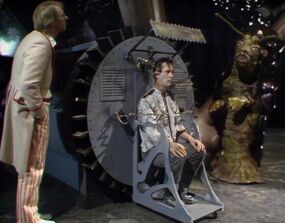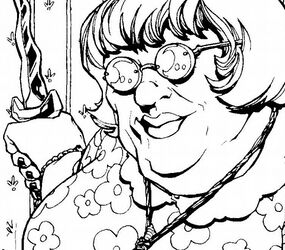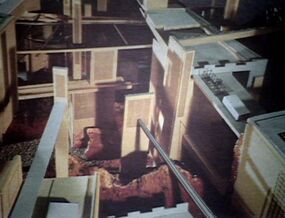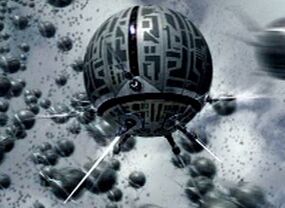Posthuman
Posthumanity was the term used to describe the human race after the destruction of Earth by the Sun in the far future. Deprived of their common cultural reference point, humans formed a loose political structure composed of many groups and subspecies known as the posthuman hegemony. (PROSE: The Book of the War)
Their territory existed at the Time Lords' frontier in time. (PROSE: Frontios, The Book of the War) With their time travel technology, posthumans were a significant faction in the War in Heaven. (PROSE: The Book of the War, Cobweb and Ivory, et al.)
Before Earth's destruction[[edit] | [edit source]]
Due to the availability of time travel in the posthuman era, many posthumans influenced their species' past. (PROSE: The Book of the War, Work in Progress) Due to the actions of the Pilots' Coterie, le Pouvoir, the 17th century French secret service, briefly acquired "mirrors" which showed them potential timelines of posthumanity. (PROSE: Newtons Sleep)
27th century human academics were familiar with the term "Posthuman". (PROSE: Work in Progress)
Transhumanity was the evolutionary stage between humanity and posthumanity. (PROSE: Stranger Tales of the City linking material)
The pre-posthuman era was home to a group of emotionless militant cyborgs who forcibly converted other humans and were in turn reviled by humanity, (PROSE: The Book of the War) known by some as the Inanem Magnanime Milites. (PROSE: Weapons Grade Snake Oil) Members of this cyborg race, such as Litany Chromehurst, were the forebears of technosapience (PROSE: Happily Ever After Is a High-Risk Strategy) and eventually became regarded as simply another posthuman subspecies, some of them forming the Silversmiths' Coterie. (PROSE: The Book of the War)
Wanting the Time Lords to take a more radical stance against the injustices of the universe, Vansell of the Celestial Intervention Agency noted that the Time Lords could approach humanity for advice and help with reforming the Web of Time into a history without injustice. (AUDIO: Neverland)
Early posthuman era[[edit] | [edit source]]
The posthuman era began with the loss of Earth, which The Book of the War and The Human Species: A Spotter's Guide indicated was circa the year 10,000,000. (PROSE: The Book of the War, Of the City of the Saved...) Another account similarly showed that the Sun swallowed Earth about ten million years after the 1st Segment of Time. (TV: The Ark) However, Compassion believed that most posthuman historians dated the destruction of Earth to 12,000,000, (PROSE: The Brakespeare Voyage) and several other accounts placed Earth's end in 5,000,000,000. (TV: New Earth, The End of the World, et al)
The period immediately after Earth's destruction, the 58th Segment of Time, (PROSE: The Well-Mannered War) was at the edge of Gallifrey's noosphere, (PROSE: The Well-Mannered War, Frontios) the frontier in time. (PROSE: The Book of the War) Early Time Lords forbid within Gallifreyan civilisation any knowledge of history beyond this point, and the Fourth Doctor regarded it as the end of the Humanian Era. (PROSE: The Well-Mannered War) Finally beyond the Ghost Point (PROSE: The Book of the War) and starting to mirror the Great Houses in several new ways, (PROSE: Of the City of the Saved...) posthuman history began with a Diaspora Era (PROSE: The Silent Stars Go By) just as the Houses' history did. (PROSE: The Book of the War)

Direct human survivors of Earth's destruction included the Guardians, who took a 700 years voyage on the Ark to Refusis II; (TV: The Ark, PROSE: The Book of the War) Revere's ship of refugees, thought by the Fifth Doctor to be one of the last surviving groups of Mankind, who colonised Frontios; (TV: Frontios) and the Morphans, who colonised Hereafter and very slowly terraformed it into a replacement Earth while the elite transhumans of pre-destruction Earth waited in hibernation. (PROSE: The Silent Stars Go By)
Two distinct political viewpoints arose in humanity from the loss of their original homeworld. One, the Arcadians, considered themselves the preservers of the old Earth's ways. They recreated Earth on 28,000 Earth-like displays, many of which were called New Earth. (PROSE: The Book of the War) One notable New Earth was founded by the "big revival movement" within 23 years of Earth's destruction. (TV: New Earth) The Arcadians were isolationist and eventually almost completely vanished, (PROSE: The Book of the War) with one group secretly surviving in suspended animation beneath the acid seas of Endpoint until near the end of the universe. (PROSE: Hope)
The other viewpoint which defined the early posthuman era was one of decadence. Mrs Foyle was a notable early era decadent who ran the House of the Rising Sun and the Remonstration Bureau. (PROSE: The Book of the War)
Beginning with the early posthuman era, humans were able to procreate with basically every other species capable of breeding; a rare trait shared with advanced factions such as the Great Houses. (PROSE: Of the City of the Saved...) With the commonality of hybridisation, some posthumans genetically modified themselves to be able to speak the language of their alien partners, as Marinthe did for Rynu. (PROSE: Farewell to a World) The Eighth Doctor once encountered a race of time-travelling Cybermen who turned to the 21st century because in their native era after Earth's destruction, humanity was scattered through the cosmos and "genetically diluted," proving unfit for cyber-conversion. (COMIC: The Flood)
No species can last forever without evolving into something new. Sooner or later the distance from Earth, from the environment humanity evolved to live in, genetic engineering and eventual interminglings of the gene pool with other species — these were bound to have the inevitable, cumulative effect of turning humanity into a completely different species.
Independent groups, people, and hive minds[[edit] | [edit source]]
A chain of posthuman worlds became the breeding-grounds of the Remote. (PROSE: The Book of the War)
Some posthuman subspecies had physical aspects of other animals originating from Earth, including dolphins and tigers. (PROSE: Of the City of the Saved...)
The Immaculata Formosii was a posthuman War Goddess who allied with many sides of the War in Heaven, including the Enemy and Faction Paradox. (PROSE: The Book of the War, Against Nature)
The posthuman (PROSE: A Hundred Words from a Civil War) Malkuthites killed the native population of Yesod, including the Yesodi, and adapted themselves into the Yesodites, who were once visited by the Eighth Doctor, Samson, and Gemma. (PROSE: The Long Midwinter, AUDIO: The Wake)
The Quire were a group of posthuman scholars who once sent six of their people to the Braxiatel Collection in the 2600s. (PROSE: Work in Progress, Tribal Reservations, Quire as Folk, Intermissions, Future Relations)
There existed posthuman giants for whom a planet was comparable in scale to a mountain to a normal-sized human. (PROSE: Unification Theory) The largest giant was Bribori Zadig, who constituted his own class of posthuman and was suspected by some to have been engineered as a piece of living art. (PROSE: Sleeping Giants)
Many posthumans became became parts of hive minds, such as the Saqqaf Hive (PROSE: Saqqaf) and Angstrom Hive. (PROSE: Of the City of the Saved...) The shoal-people spread their individual minds among many fish, each person their own hive mind. (PROSE: Just Passing Through)
Akroates came from an isolated society of posthuman shepherds who resembled cyclopses. (PROSE: Akroates)
A fabled clan of long-limbed posthumans lived on Trapezium. (PROSE: The Baker Street Dozen)
The Entrustine Horde were an obscure posthuman barbarian guild. (PROSE: Of the City of the Saved...)
The colonists of the ocean world Widowseed diverged into the Seaborn and Airborne, who brutally warred for control of the gigawrack, each denying the others' humanity. (PROSE: Salutation)
A-Ph-Aa came from a cuboid race of posthumans with a rich history who were made to never exist once history changed so that humans never colonised their homeplanet. (PROSE: Mourning the Story)
In the 11th billennium, several posthuman types were created along eugenic principles, including the Neotonic Clade. (PROSE: Unification Theory)
Empires and Coteries[[edit] | [edit source]]

About two million years after Earth's demise, circa 12,000,000, the posthuman era entered its height as empires began emerging from the decadant movement. (PROSE: The Book of the War) The most notable of these were the aristocratic Blood Coteries based in Siloportem. (PROSE: The Book of the War, AUDIO: Movers) The Blood Coteries included the Pilots of Civitas Solis, (PROSE: The Book of the War, Newtons Sleep) the Weavers, and the Silversmiths. (PROSE: The Book of the War)
The miniscule Plume Coteries were librarians who lived in the distant reaches of dead space. (PROSE: Cobweb and Ivory)
Gargil Krymtorpor, who lived from 12,023,711 to 12,023,967, was a posthuman interstellar pirate who renegaded from Siloportem and became indentured to the Celestis. (PROSE: The Book of the War)
At the time of the last humanoid Arcadians of the Milky Way, posthumans led by Linemica resurrected Cernunnos using delicate craftmanship and illegal time travel. Dignitaries from countless posthuman cultures attended Cernunnos' unveiling on Terra Primagenia. (PROSE: Cobweb and Ivory)
A splinter Coterie became lost on a million-year mission across the cosmos, during which radiation affected their evolution by activating "a few forgotten DNA pathways". Little Brother Intrepid of Faction Paradox transported some of their eggs backwards through time to a prehistoric swamp, where they evolved into Drashigs (PROSE: Daring Initiation)
Marko Marz was a transhuman Plutocrat from an openly mercantile posthuman period. Despite time travel being taboo among the Coteries, Marz publicised his interest in it (PROSE: Subjective Interlock) and had his book Retroeconomics and Timeschism for Dummies published in the past, 4973. In the book, Marz mentioned that the Dealers in Yellow operated in his era. (PROSE: Pre-narrative Briefing L)
The Chance Coteries were a wealthy cymbiont civilisation who, during the reign of Scacia De Rein circa 19,531,250,000,007,031, manipulated public perception of technosapiens across the posthuman hegemony. De Rein secretly supported the revolution on Pluto against the Company which led to the foundation of the Plutonic Republic of Technosapien Enhanced Cultures. The revolution led to increased sympathy and understanding for technosapiens. PROTEC's president, Sojourner Hooper-Agogô, later teamed with Faction Paradox Bankside to cause the fall of the Chance Coteries. (PROSE: Weapons Grade Snake Oil)
The Technosapien Interstellar Cooperative spanned many worlds, including the AutoFolk's homeworld Mechanique II. (PROSE: Happily Ever After Is a High-Risk Strategy)
The Million-Star Alliance did not actually span a million stars, but it did include the mining planet Isoptal, where posthumans survived by turning themselves into artificial intelligences known as the Isoptaline. (PROSE: Weighty Questions, Salutation)
The last humans[[edit] | [edit source]]
By 6,000,000,000, the posthumans previously living on Pluto had modified themselves into homo solarians and colonised the expanding Sun. They died when the Sun was swallowed by Grandfather's Maw. Compassion considered this to be the ultimate fate of humanity, with all the posthuman groups outside the solar system being mere off-shoots of the core continuity. (PROSE: The Brakespeare Voyage)
The Lasthumans were widely considered the final posthuman civilisation. (PROSE: Of the City of the Saved...) Their God-King was Het Linc. (PROSE: The Book of the War) They created the Universal Machine in their last millennia before being massacred by House Mirraflex in 334,961,147,104. (PROSE: Of the City of the Saved..., The Book of the War)
While the psychics of the Lasthumans had scoured the universe and found no other human minds, there also existed strands of humanity posthumously termed the "revolved" who evolved into mindless beings then "revolved" back into conscious creatures. (PROSE: Of the City of the Saved...) The Tenth Doctor encountered a group of humans on Malcassairo in 100,000,000,000,000 whose ancestors had spent millions of years evolving into gas and another million as downloads, only to return to the "fundamental" humanoid shape of their species. The War Master hid from the Last Great Time War among these humans (TV: Utopia) and caused their evolution into the Toclafane. (TV: Last of the Time Lords)
Near the end of the universe, when the universe was ruled from the Needle by the Imperial Family, the planet Endpoint was home to the human-descended Endpointers as well as a secret faction of "genetically pure" humans (PROSE: Hope) of the Arcadian viewpoint (PROSE: The Book of the War) in suspended animation. The Eighth Doctor, Fitz Kreiner, and Anji Kapoor came to Endpoint, got caught up in the reawakening of the humans, and ensured peace between the Endpointers and the humans. (PROSE: Hope)
One of the Toymaker's many possible, contradictory origins was that he was a "human-descended entity from the end of time". (GAME: The Celestial Toymaker [+]Loading...["The Celestial Toymaker (game)"])
In the City of the Saved[[edit] | [edit source]]
Posthumanity's final creation, the Universal Machine, was one of the Secret Architects of the City of the Saved. (PROSE: Of the City of the Saved...) All of posthumanity was resurrected in the City. (PROSE: The Book of the War)
During the City of the Saved Civil War, the most sophisticated posthuman factions fought in ways incomprehensible to common humans. Five Districts warred entirely with music and representatives of two cultures went into combat in Flautencil's Plaza which appeared to consist only of smelling orchids and exchanging meaningful glances. (PROSE: A Hundred Words from a Civil War)






